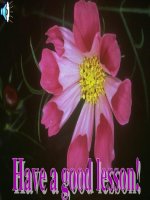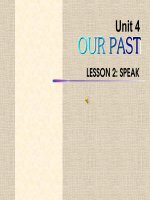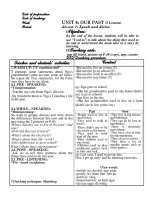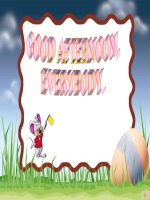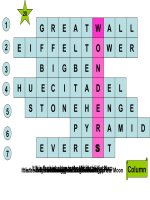Unit 4 lesson 2 speak listen period 21 week 7
Bạn đang xem bản rút gọn của tài liệu. Xem và tải ngay bản đầy đủ của tài liệu tại đây (122.8 KB, 3 trang )
Gi¸o ¸n TiÕng anh 8
Phßng gi¸o dôc MÜ hµo
Trêng thcs d¬ng quang
TuÇn: 7
Ngµy so¹n:
d¹y:
TiÕt: 21
Ngµy
Unit 4 our past
Lesson 2 Speak & Listen
A. The objectives
- By the end of the lesson, Ss will be able to further practice in ‘used to’ and to
listen to an English story for main ideas and specific information. They’ll use
the language to talk about the different between life at the present and life in
the past, using the suggested pictures and they’ll use the language to talk
about their past habits. They’ll retell the story in their own words.
b. content: Vocabulary: Words to describe life in the past and modern life
Grammar and structures: Past simple tense, Used to
C. Materials: Pictures, CD player, disk, poster
Work arrangements: Individuals, pairs, groups, T-WC
Anticipated problems: It may take longer time than expected
D. Procedure
I. Warmer
Kim’s game
Look at the pictures. What are they
about?
Look at them again in 30 seconds and
write down the words/ phrases that
describe them
Work individually, share and compare
Teacher gets feedback
Did people work hard on the farm?
Did they walk to travel?
Did they live in small houses?
Did children go to school?
Or: Matching (Poster)
Put the words/ phrases in the correct
column
Life in the past
Life now
II. Checking the old lesson
III. New lesson
Pre-speaking
Set the scene, introduce the pictures
above
Model sentences:
People used to live in small houses
Children didn’t use to go to school
Concept check: meaning, form, use,
pronunciation
Use: Did people live in small house?
Do they live in small house now?
Did children go to school?
I. Speak
Used to
Form: S + used to + bare
infinitive
S + didn’t + use to + bare
infinitive
Did + S + use to + bare
infinitive?
Yes, S + did / No, S + didn’t
‘Used to’ to talk about past
habits that are no longer now.
Vò M¹nh Hµ / / 0982928076
1
Do they go to school now?
While-speaking
Picture drill
Run through the pictures
- walk to travel
- live in small houses
- be no electricity
- work hard on the farm
Modeling, choral & individual repetition
Picture differences
Ask students to practice talking about
the differences between each pair of the
pictures
Ask students to look at the pictures in
the textbook
Students work in groups of three to talk
about life in the past and life now
Teacher goes round, monitors, and gives
prompts, encourages them to speak in
English and use ‘used to’ structure.
Comment on students’ performance/
content/ language
Post-speaking
Take a survey
Work in groups of four
Report back the result of the survey
People used to walk to travel
People used to live in small
houses
People used to work hard on the
farm
There didn’t use to be electricity
There used to be no electricity
Children didn’t use to go to
school
But now they work in modern
and comfortable offices and
have
more
time
for
entertainments.
They travel to work by bus, by
car, etc
There is electricity and people
enjoy comfortable life.
People
live
in
modern,
comfortable
and
convenient
buildings
Children now enjoy school.
People used to walk a long way
to work or to the market. But
now they can travel by car, by
taxi, by bus, train, …
There didn’t use to be electricity
in the home but now there is
electricity
with
modern
equipment.
People used to work hard on the
farm all the time but now they
have
more
time
for
entertainments
Children used to stay home but
now they enjoy school
Tell your partner about the
things you used to do last
year
Name
Last
year
Now
Pre-listening
Pre-teach
Prediction: Ordering statement prediction What did you use to do last
year?
I used to go to school on foot
While-listening
Did you use to wear your hair
Listen and check their prediction
long?
Listen and again and choose the most
moral lesson
II. Listen
Vò M¹nh Hµ / / 0982928076
2
Post-listening
Ask students to retell the story
IV. Consolidation
V. Homework
1. Vocabulary
- greedy (adj):
- foolish (adj):
- shout (v):
- amazement (n):
- excitedly (adv):
- lay (v) laid:
2. Ordering
a. A farmer lived a comfortable
life with his family.
b. One of his chickens laid a
gold egg.
c. He went to collect the eggs.
d. He decided to cut open all the
chickens
e. His chickens were all dead
f. There were no more eggs of
any kinds
Used to to talk about past
habits/events
Listen to a traditional story
Study vocabulary by heart
Practice talking about life in
the past and life now
Retell the story in your own
words
Prepare new lesson: Read
Vò M¹nh Hµ / / 0982928076
3

